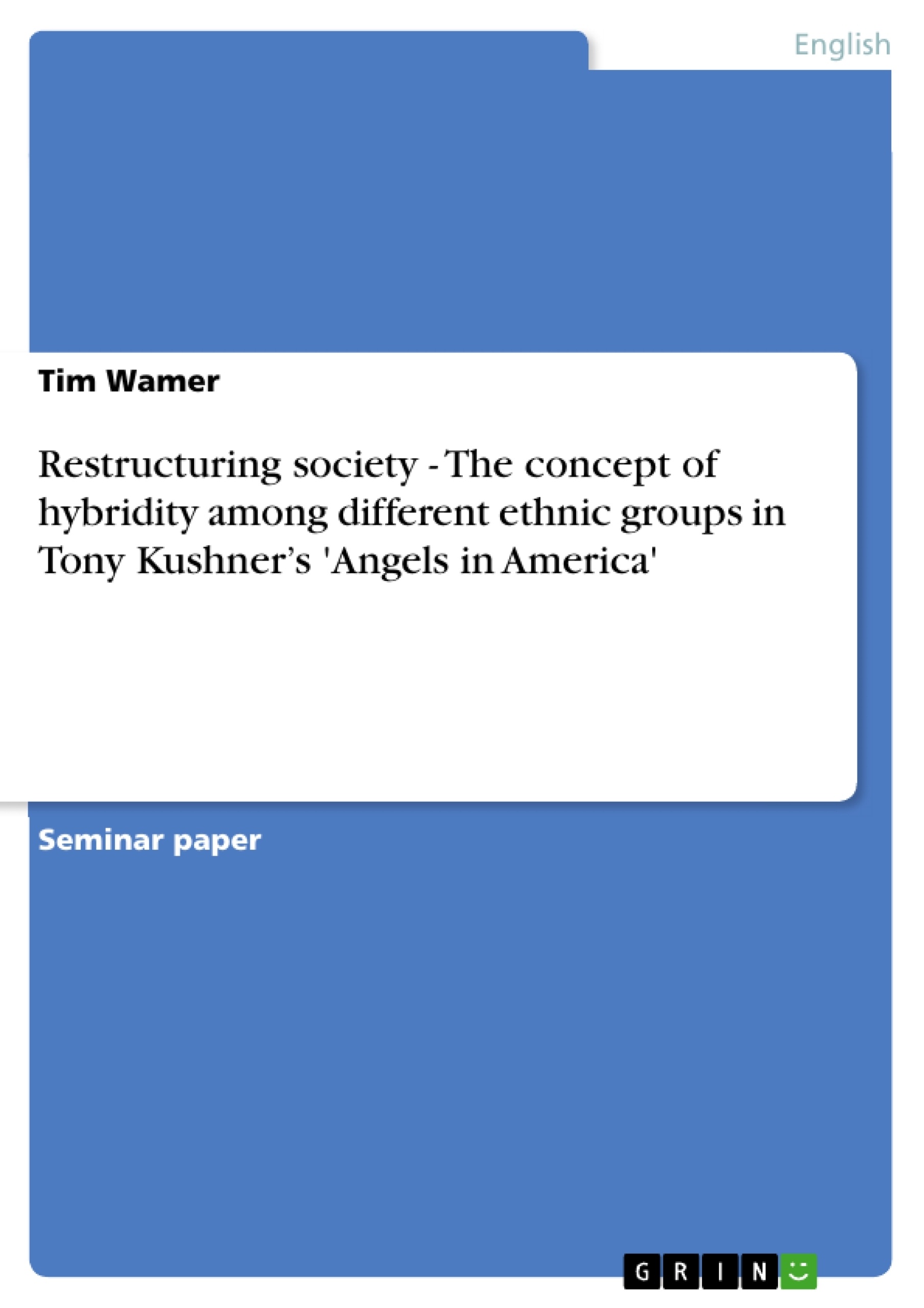Tony Kushner’s Angels in America is a very complex drama dealing with many different themes. This seminar paper analyses the theme of social reconstruction. As I will expound, hybridity is the form of society aimed at by the characters of this play who strive for social change. In order to demonstrate the concept of a hybrid society, I analyse the characters who represent this idea with regard to their ethnic group membership and their position in society. On this basis, their views and interests become more evident and easier to understand. After that I analyse and interpret their role in the play in order to point out the consequences for the concept of social reconstruction towards a hybrid society.
First, the terms ethnicity and hybridity, which are essential for the analysis, are explained briefly. The next part of this paper presents two characters from different ethnic groups (Prior and Belize) striving for social change. On the basis of their position in society and their role in this play I then expound the concept of hybridity in the drama before analysing the relationship between Prior and Belize with regard to this idea. In chapter 4, other indications demonstrating if and how a social reconstruction is achieved are pointed out. The result of this analysis is summarized in the conclusion.
The chapter providing background information is mainly based on articles in reference books. Chapter 3 and 4 are built up on the analysis of Angels in America itself, whereas essays dealing with ethnicity and the concept of social reconstruction in this play serve as support for my work.
Table of Contents
- Introduction
- Background Information
- Ethnicity vs. Race
- Hybridity
- Ethnic Groups in Angels in America
- WASPs in Angels in America
- Afro-Americans in Angels in America
- The Relationship between Prior and Belize
- A Successful Collaboration
- Conclusion
Objectives and Key Themes
This seminar paper analyzes the theme of social reconstruction in Tony Kushner’s Angels in America, focusing on how the concept of hybridity is used to portray a society striving for change. The paper examines different ethnic groups and their characters, highlighting their views, interests, and roles in the play. By exploring the concept of hybridity through the interactions of these characters, the paper ultimately aims to understand the consequences for social reconstruction towards a hybrid society.
- Social reconstruction
- Hybridity as a form of social change
- Ethnic group membership and its impact on social change
- The role of characters representing different ethnic groups in the play
- The consequences of social reconstruction towards a hybrid society
Chapter Summaries
The introductory chapter provides an overview of the research topic, outlining the paper's focus on social reconstruction and the concept of hybridity in Angels in America. Chapter 2 defines key terms – ethnicity and hybridity – clarifying their distinctions and significance for the analysis. The chapter also briefly addresses the relationship between ethnicity and race, establishing a framework for understanding the complex interplay of cultural and racial identities in the play.
Chapter 3 examines the portrayal of specific ethnic groups in Angels in America, focusing on WASPs and Afro-Americans. The chapter analyzes the characters representing these groups, highlighting their positions in society and their views on social change. Chapter 4 delves further into the concept of hybridity by exploring the relationship between Prior and Belize, two characters from different ethnic groups. The chapter aims to understand how their interactions contribute to the idea of social reconstruction and the emergence of a hybrid society.
Keywords
Key themes explored in this paper include social reconstruction, hybridity, ethnicity, race, ethnic group membership, cultural identity, and social change. The analysis focuses on characters representing various ethnic groups in Tony Kushner’s Angels in America and examines their roles and interactions to understand the implications of hybridity for the construction of a new social order.
Frequently Asked Questions
What is the concept of "hybridity" in Angels in America?
Hybridity refers to a form of society where different ethnic and cultural identities blend to create a new, reconstructed social order.
Who are Prior and Belize in the play?
Prior (a WASP) and Belize (an Afro-American) are central characters whose relationship exemplifies the collaboration needed for social change.
How does ethnicity differ from race in this analysis?
The paper distinguishes between cultural identity (ethnicity) and physical categories (race) to better understand the characters' social positions.
What is Tony Kushner's message about social reconstruction?
Kushner suggests that social change requires breaking down traditional barriers and fostering collaboration between diverse ethnic groups.
What roles do WASPs and Afro-Americans play in the drama?
The play contrasts their different societal positions and interests to highlight the challenges and possibilities of creating a hybrid society.
- Arbeit zitieren
- Tim Wamer (Autor:in), 2005, Restructuring society - The concept of hybridity among different ethnic groups in Tony Kushner’s 'Angels in America', München, GRIN Verlag, https://www.grin.com/document/75462



